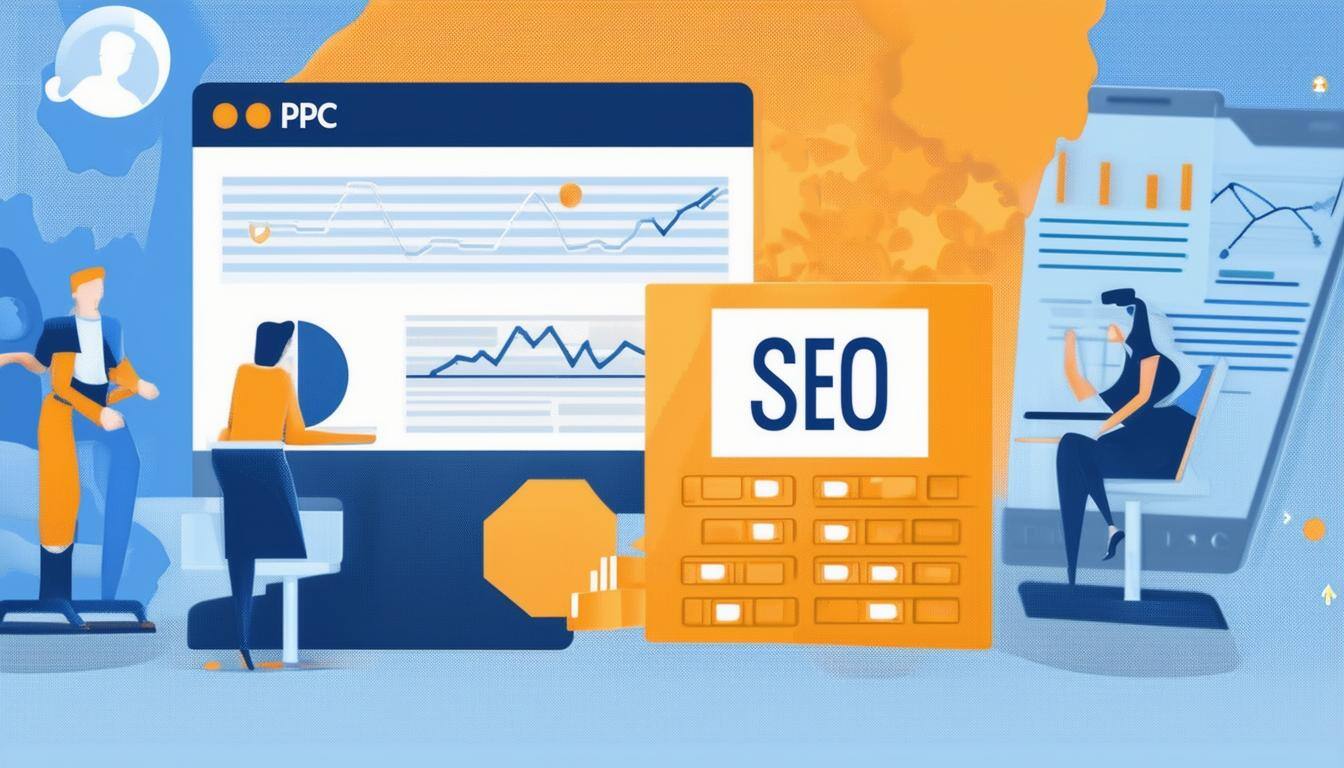Which is Better: PPC or SEO?

A strong digital marketing strategy is essential for your business – and when it comes to traffic-generating tactics, there are two strategies that come out on top every time: PPC and SEO.
It’s no wonder, then, that when it comes to driving traffic and generating leads, many businesses find themselves asking a familiar question: "Which is better - PPC or SEO?"
It’s a question we’re asked all the time here at Angelfish. So, what’s the answer? Well, as with most things in life, it’s complicated. The truth is that both methods have their merits, and both can significantly boost your online presence and help you connect with your target audience.
However, they operate differently, and the best choice for your business may depend on your specific goals, resources, and budget.
In this blog, we'll explore the benefits of both PPC (pay-per-click) and B2B SEO (search engine optimisation), how they work, and why they are most powerful when used together.
What is SEO?
First things first, what is SEO? SEO (search engine optimisation) refers to the process of improving your website’s visibility in organic (non-paid) search engine results, essentially by crafting your website to meet the needs of search engines.
The aim of SEO is to rank your website higher for relevant keywords so that when potential customers search for products or services like yours, your business appears near the top of the results. There are multiple types of SEO, which can be divided into two main buckets: on-page SEO and off-page SEO.
On-page SEO is basically everything you can do on your website to improve rankings, such as posting and optimising regular, educational content and target keywords. On the other hand, off-page SEO refers to the steps taken to improve rankings without alternating content on your website, such as backlink campaigns to increase domain authority.
Benefits of B2B SEO
There are a number of key benefits of SEO for B2B businesses, such as:
Long-term results
Unlike paid advertising, SEO doesn’t stop delivering once you stop paying. In fact, done correctly and when properly maintained, your site can generate traffic for months or even years after your initial investment.
Increased credibility
Users tend to trust organic search results more than paid ads. This means that by ranking highly in organic searches, your business can gain credibility and authority in your industry.
Cost-effective
While there’s no denying that SEO requires investment in time and resources upfront, once you’re set up and your SEO strategy is in place, the ongoing costs are generally lower than PPC.
Higher click-through rates (CTR)
This is one of the biggies: organic search results tend to get more clicks than ads, especially from users who are sceptical of paid listings.
Supports the buyer’s journey
Last but no means least, B2B SEO allows you to create content that targets users at different stages of the buying cycle, from awareness right through to decision-making.
SEO Challenges to Consider
There are, of course, some difficulties with B2B SEO that need to be considered too, such as:
Results aren’t immediate
It can take a while for SEO to work. In fact, it will typically be three-six months before you start seeing results, and it will probably take longer to page one of SERPs. Remember, patience is key when it comes to SEO!
Tough competition
Some keywords are super competitive, and it’s pretty common for businesses to end up fighting for the same keywords, which can make it difficult to stand out from the crowd.
Hard to keep up
Algorithms are constantly changing, and let’s face it, there’s nothing Google loves more than an update. This means that once you get to page one of the SERPs, you’ll need to work hard to stay there.
Time-consuming
From figuring out what type of content to put out there to creating an SEO strategy, there’s no denying that SEO can be time-consuming (which is exactly why working with an SEO agency like Angelfish can help to save you time and stress!)
What is PPC?
So, what is PPC? PPC (pay-per-click) is a form of online advertising where businesses pay a fee each time one of their ads is clicked.
The most common type of PPC is search engine advertising, where your ads appear at the top of search engine results pages (SERPs) for certain keywords. However, it’s important to note that your link will have a “sponsored” tag next to it, so people will know you paid for the ad.
Benefits of PPC
Just like B2B SEO, there are a number of important benefits of PPC for B2B businesses, including:
Immediate results
Unlike SEO, which can take time to see significant results, PPC can start driving traffic to your website almost instantly. This is especially useful for new businesses or when launching a new product or service.
Precise targeting
PPC also allows you to target specific demographics, locations, and even the time of day your ads will appear. This ensures your ads reach the right audience at the right time.
Budget control
With PPC, you can set a specific budget and only pay when someone clicks on your ad. This gives you complete control over how much you spend.
Visibility for competitive keywords
If your industry is highly competitive and it’s difficult to rank for certain keywords organically, PPC is a super powerful way to climb the ranks and appear at the top of search results – as long as you have the budget to do so.
A/B testing capabilities
PPC platforms also make it easy to test different versions of your ads to see what resonates best with your audience, which can provide valuable insights into your messaging and positioning.
Challenges of PPC
As with SEO, there are of course downsides to PPC too. These include:
Might not generate profit
There's no guarantee that you will appear on SERPs as it’s possible a competitor might outbid you for the same terms and phrases. Plus, even if you do make it to the top of page one, a whopping 94% of users skip paid search results.
Expensive
PPC can also be pricey as a long-term strategy. Because you pay every time someone clicks on your ad, things can add up pretty quickly.
Temporary results
With PPC, visibility is temporary. As soon as you stop paying for your ads, they are pulled – and as soon as your ads are pulled, your visibility will plummet.
SEO vs. PPC: Which Should You Choose?
So, which SEO solution is right for your business? While B2B SEO offers long-term, sustainable results, PPC provides immediate visibility and traffic. The choice between the two really depends on your goals, budget, and timeframe.
However, it’s important to recognise that SEO and PPC are not mutually exclusive, and one isn’t necessarily better than the other. In fact, they often work best when used together.
Why SEO and PPC Are Better Together
Using PPC and SEO together enables you to maximise the benefits of each and create effective, powerful marketing campaigns. For example, PPC can help you to boost visibility and get your name out there fast, and you can then run an SEO campaign to increase your organic traffic, gradually reducing the amount you spend on PPC.
Here’s how the two methods can complement each other:
Increased visibility
By combining both SEO and PPC, you can dominate search engine results pages. While your SEO efforts ensure you rank highly in organic results, PPC ads can give you extra visibility at the top of the page.
Keyword insights
PPC campaigns provide valuable data on which keywords are driving clicks and conversions. This information can be used to inform and refine your SEO strategy, ensuring you target the right keywords.
Remarketing opportunities
PPC allows you to retarget visitors who’ve previously interacted with your website. These users may have found your site through organic search, and PPC gives you the opportunity to stay top of mind and nurture them towards conversion.
Maximised ROI
SEO drives cost-effective, long-term traffic, while PPC can quickly generate leads. Together, they ensure you’re attracting both immediate and sustainable traffic, maximising your return on investment.
Cross-channel consistency
Using SEO and PPC together ensures your messaging is consistent across both organic and paid search, reinforcing your brand and making it easier for potential customers to engage with your business.
Conclusion: A Combined Approach is Key
So, which is better: PPC or SEO? The truth is, neither is inherently better than the other. Both have their unique strengths, and both can drive significant traffic and leads to your business.
Rather than seeing them as two competing strategies, here at Angelfish, we always recommend that our clients view PPC and SEO as complementary tools in their digital marketing toolkit. By using these two powerful tools together, you can create a robust, data-driven approach that delivers both immediate and long-term results.
Ready to optimise your search strategy? At Angelfish Marketing, we’ve been helping businesses like yours climb search engine rankings for years. There’s nothing our expert team doesn’t know about B2B SEO and PPC, and we can work together with you to help you develop an integrated approach that aligns with your business goals and delivers real, measurable results.
Let’s get going! download our FREE beginners guide to SEO to get started and discover how to get your website seen, shared, and found.

About the Author: Richard Stephens
AuthorRichard is the director and co–founder of Angelfish Marketing, a digital marketing agency specialising in inbound marketing for B2B SME’s.
Connect on LinkedInReady to Unlock AI SEO for Your Business?
AI SEO isn’t coming — it’s already here. Capture high-intent traffic and build sustainable pipeline growth.
Get Your Free Audit
